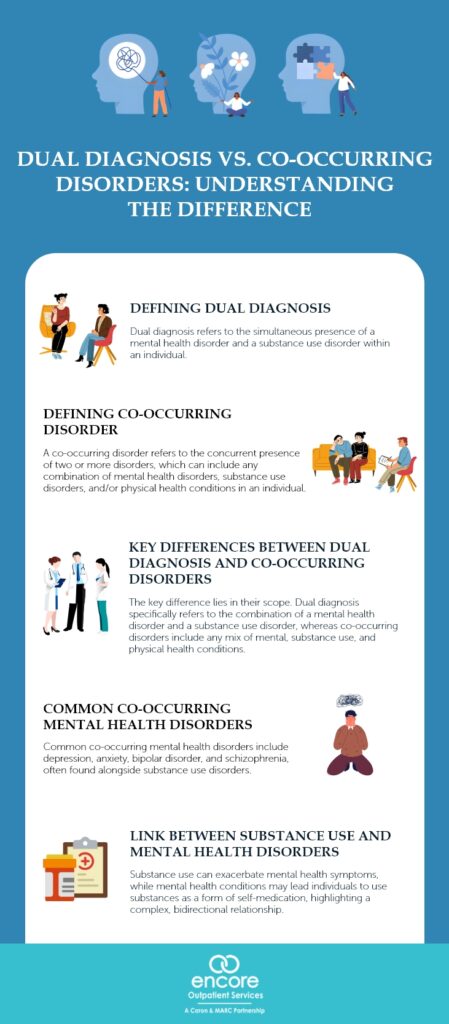Our dedication lies not just in treating symptoms but in addressing the root causes, offering a holistic approach that integrates the best of therapeutic practices with the warmth of community support.
Dual Diagnosis vs. Co-occurring Disorders: Understanding the Difference

Dual diagnosis and co-occurring disorders are terms used to describe situations where individuals experience both substance use and mental health challenges simultaneously. Despite their frequent interchangeable use, these terms describe distinct scenarios that significantly impact diagnosis, treatment, and recovery. This blog post aims to demystify the differences between dual diagnosis and co-occurring disorders, providing clarity on each term’s specific meaning, the challenges associated with their identification and treatment, and the importance of tailored therapeutic approaches. Examining the nuances of each situation can contribute to informed discussions and decisions regarding care and support.
Defining Dual Diagnosis
Dual diagnosis is not a single, distinct diagnosis in itself; rather, it describes the coexistence of two distinct but interrelated diagnoses: a mental health disorder and a substance use disorder (SUD) within the same individual. It highlights the relationship between mental health conditions (such as anxiety, depression, bipolar disorder, etc.) and substance use challenges (including alcohol, drugs, or prescription medication misuse), emphasizing the need for integrated treatment approaches that address both disorders simultaneously.
According to a study published in 2022 by the National Institutes of Health (NIH), adults who were diagnosed with dual diagnosis were estimated to constitute 25.8% of those with any psychiatric disorder, 36.5% of those with any substance use disorder, and 17.8% of the total population of adults with either disorder.
The concept of dual diagnosis emerged as healthcare professionals observed that treating either interaction in isolation often resulted in limited success, underscoring the need for an integrated approach to address both scenarios simultaneously. Understanding dual diagnosis is crucial for developing effective treatment plans, as it acknowledges the intricate relationship between mental health and substance use and the way each condition can exacerbate the other. By identifying the dual presence of these disorders, healthcare providers can better tailor interventions that address the comprehensive needs of the individual, offering a more holistic path to recovery.
Defining Co-Occurring Disorder
A co-occurring disorder describes the presence of two or more disorders occurring simultaneously in an individual, which may include a combination of mental health disorders, substance use disorders, and/or medical conditions. Unlike the specific focus of dual diagnosis on the interconnection between mental health disorder and substance use disorder, the term co-occurring disorders encompasses a broader spectrum of possible combinations of conditions. This broader perspective is critical in the medical and therapeutic fields, highlighting the need for a comprehensive approach to diagnosis and treatment that considers the full range of an individual’s health challenges.
According to the 2022 National Survey on Drug Use and Health (NSDUH), approximately 21.5 million adults aged 18 or older had co-occurring serious mental illness (SMI) and a substance use disorder in the past year.
Recognizing co-occurring disorders is essential for formulating effective treatment strategies that address all underlying and interconnected conditions, thereby improving the overall health and well-being of the affected individuals. The concept underscores the complexity of diagnosing and treating individuals with multiple health conditions, emphasizing the importance of integrated care that is responsive to the unique and diverse needs of each person.

Key Differences Between Dual Diagnosis and Co-occurring Disorders
The key difference between dual diagnosis and co-occurring disorders lies in their scope. Dual diagnosis specifically refers to the simultaneous presence of a mental health disorder and a substance use disorder. In contrast, co-occurring disorders encompass a broader range of conditions, including any combination of two or more disorders, which can be mental health conditions, substance use disorders, or other medical conditions. This distinction is crucial for understanding the nature of an individual’s health challenges and for developing effective, comprehensive treatment plans.
Common Co-Occurring Mental Health Disorders
Some of the most common co-occurring mental health symptoms seen alongside substance use disorders include:
- Generalized Anxiety Disorder (GAD) – Generalized anxiety disorder is one of the most common co-occurring conditions characterized by persistent and disproportionate anxiety that can lead individuals to self-medicate with substances.
- Attention Deficit Hyperactivity Disorder (ADHD) – ADHD, often diagnosed in childhood or teenage years, can lead individuals to develop substance use challenges. Studies have shown a significant association between ADHD and substance use disorders.
- Post-Traumatic Stress Disorder (PTSD) – PTSD, commonly associated with traumatic experiences like violence or abuse, can lead individuals to turn to alcohol or drugs to cope with symptoms, contributing to substance use disorders.
- Clinical Depression – Depression, a complex mental health condition, is often linked to substance use disorders, although the relationship is not consistently patterned. Drug and alcohol use can exacerbate symptoms of depressive disorder.
- Bipolar Disorder – Bipolar disorder is characterized by intense mood swings between emotional lows and highs. Studies have shown a significant connection between bipolar disorder and addiction, with substances worsening the symptoms of bipolar disorder and even causing the disorder in individuals without a history of mental health conditions.
The intricate relationship between mental health conditions and substance abuse disorders emphasizes the importance of integrated treatment approaches to address both aspects concurrently for effective recovery.
Link Between Substance Use and Mental Health Disorders
There are three main reasons why substance use disorders and mental health disorders often occur together:
- Common Risk Factors – Shared risk factors such as genetic predisposition, stress, and trauma, especially in childhood, can contribute to the development of both mental health conditions and substance use challenges.
- Self-Medication – Substance use can exacerbate symptoms of mental health disorders, while mental health conditions may lead individuals to self-medicate with drugs or alcohol for temporary relief, potentially leading to addiction.
- Changes in Brain Function – Substance use and addiction can lead to changes in brain chemistry that make individuals more susceptible to developing a mental disorder. This interaction between substance use and mental health can create a cycle where each condition exacerbates the other.
This bidirectional relationship underscores the need for integrative care that addresses both mental health and substance use simultaneously to effectively support recovery and improve outcomes for individuals facing these intertwined challenges.
Challenges in Diagnosis and Treatment
The diagnosis and treatment of dual diagnosis and co-occurring disorders face several challenges, including:
- Differentiating Symptoms – Overlapping symptoms of mental health and substance use disorders can complicate diagnosis.
- Integrative Care – Effective care necessitates integrated treatment models addressing both mental health and substance use disorders simultaneously.
- Societal Stigma – Stigma surrounding mental health and substance use disorders can deter individuals from seeking necessary treatment.
- Relapse Risks – The intertwined nature of these disorders increases the challenges in treatment adherence and the potential for relapse.
- Inadequate Insurance Coverage – Mental health services may not be fully covered by insurance, leading to gaps in comprehensive and long-term treatment, including inpatient care, which is essential for managing co-occurring disorders.
- Gaps in Service – Incomplete or inadequate care due to poor communication among providers, insufficient professional training, and limited access to services can hinder the recovery process for individuals with dual diagnoses or co-occurring conditions.
- Trauma-Informed Care – Traumatic experiences can significantly impact mental health and substance use disorders. Implementing trauma-informed services is crucial to understanding how trauma influences an individual’s response to treatment and creating a supportive environment tailored to their needs.
- Seamless Continuum of Care – Treatment for dual diagnosis and co-occurring disorders involves managing progress across different areas, where improvements in one aspect might be accompanied by challenges in another. Effective patient care coordination requires ongoing monitoring and reassessment, which can be complicated by communication barriers among treatment teams.
These factors collectively make it difficult to provide effective and holistic care, emphasizing the need for comprehensive strategies and resources to support individuals with comorbid conditions.
Treatment Approaches and Strategies
Treatment approaches for dual diagnosis and co-occurring disorders emphasize integrative care that concurrently addresses mental health and substance use challenges.
- Integrated Treatment Models – Modern approaches increasingly emphasize integrated treatment plans that address both mental health disorders and substance use challenges. This holistic approach has shown improved patient outcomes by considering the unique needs of each individual.
- Personalized Patient Care – Tailored, patient-centric approaches that consider each individual’s unique circumstances and needs are crucial for effective treatment programs. Individualized treatment plans emphasize treating the individual, not just the symptoms, leading to more effective and sustainable management and recovery.
- Medication Management – This involves the strategic use of pharmaceuticals to treat specific withdrawal symptoms and physical conditions present. This approach requires careful selection, dosing, and monitoring of medications to effectively address mental health disorders and substance use challenges simultaneously.
- Psychotherapy – This therapeutic approach addresses the psychological aspects of these conditions. It involves structured conversations and interventions facilitated by a trained therapist to help individuals understand their thoughts, emotions, and behaviors. Various forms of psychotherapy, including cognitive-behavioral therapy (CBT), dialectical behavior therapy (DBT), trauma-focused therapy, and others, are utilized based on the individual’s specific needs.
- Peer Support – Programs such as Alcoholics Anonymous (AA), Narcotics Anonymous (NA), Dual Recovery Anonymous (DRA), and peer-led support groups may offer opportunities for individuals in recovery to connect, share experiences, and provide mutual support.
- Family Therapy and Support – This approach can include family therapy sessions, educational programs about the disorders, and strategies for creating a supportive home environment. It emphasizes the role of the family as a crucial support network, aiding in the recovery process by enhancing communication, reducing stigma, and fostering a deeper understanding of the challenges faced by the individual.
- Lifestyle Changes – This includes maintaining a balanced diet, regular physical activity, adequate sleep, and stress management practices. Such changes aim to enhance physical health, which is often compromised in these situations, and to provide a stable foundation that supports mental health improvements and substance use recovery.
By implementing these treatment approaches and strategies, individuals with dual diagnosis and co-occurring disorders can receive comprehensive care that addresses both their psychiatric symptoms and substance use challenges, leading to improved quality of life and long-term recovery journeys.
For those seeking a comprehensive approach to overcoming the challenges of dual diagnosis and co-occurring disorders, Encore Outpatient Services offers integrated care that addresses both mental health conditions and substance use challenges. Focusing on holistic treatment and recovery, Encore provides a supportive environment with different levels of care designed to foster long-term well-being and improved quality of life. Experience the difference with Encore Outpatient Services and take the first step towards a brighter, healthier future.
Let Us Support You On Your Recovery Journey!
Copyright 2025 Encore Recovery | All Rights Reserved
